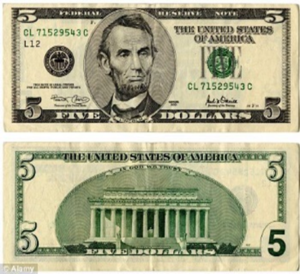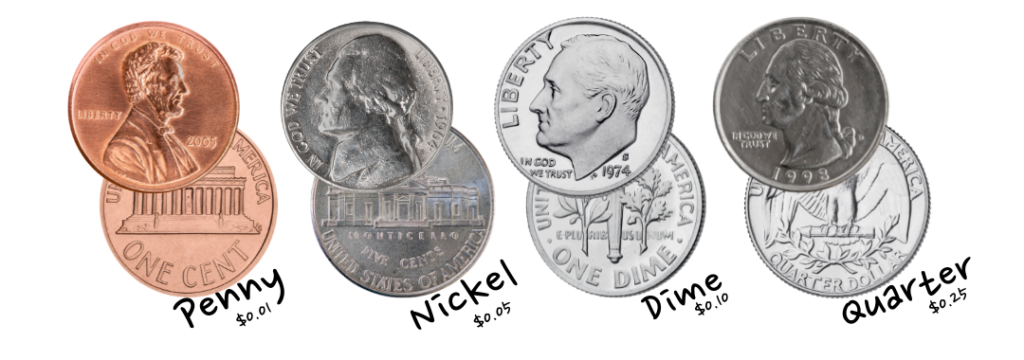By Erin Lynn – National African Student Association, Inc.
UNDERSTANDING U.S. CURRENCY, TAXES, and TIPPING
U.S. Currency
The term “U.S. dollar” refers to a specific denomination and the U.S. currency in general. U.S. currency is distributed through paper bills and coins. There are seven denominations in bills produced: $1, $2, $5, $10, $20, $50, and $100. Each bill will have the amount it is worth on each corner, front and back. For example, the $5 bill looks like this:

You may also hear money referred to as “bucks!” Example: It cost 50 bucks!
There are six denominations of coins produced, the breakdown of which is as follows:
Penny – 1 cent, or 1/100th of $1, written as 1Ȼ or $.01
Nickel – 5 cents, or 1/20th of $1, written as 5Ȼ or $.05
Dime – 10 cents, or 1/10th of $1, written as 10Ȼ or $.10
Quarter – 25 cents, or 1/4th of $1, written as 25Ȼ or $.25
Half Dollar – 50 cents, or 1/2 of $1, written as 50Ȼ or $.50 (Rare)
Dollar – 100 cents, or 1 (paper) dollar, written as $1 (Rare)

Taxes
On most purchases in most cities and states, you may also have to pay a sales tax on items you buy. Sales tax is a state tax added to any item sold, except for certain food items. The amount of sales tax varies by city, county, and state. There may also be other taxes within the county that may cause the overall price of goods and services to increase.
Example and Payment
Let’s say you are out shopping in Columbus, Ohio, and you find a t-shirt you want to buy. The t-shirt has a sticker price of $17.95 (or 17 dollars and 95 cents). Ohio has a state sales tax of 5.75% that will be added on to the final cost of the shirt. With the state sales tax added, now the cost of the shirt is $18.98. Columbus, Ohio, has 2 additional taxes that are separate from the state sales tax, and these 2 taxes will add another 1.75% to the total cost of the shirt. Now, the final cost of the shirt is $19.30. This may not seem like such a big deal when you’re talking about a $17.95 shirt, but it adds up when you consider bigger purchases, like a TV or video game system. (A $400 television bought in Columbus would be $430 after taxes!)
Now, you’re at the counter, and your new total is $19.30. Unlike in some other countries you may have visited, you probably won’t be able to get the seller to lower the price or trade some item of value for it. Thankfully, you usually do not have to have exact change, and most places will accept cash, credit or debit cards, and maybe even traveler’s checks. If you give this seller a $20 bill, or any combination of paper bills that add up to twenty dollars, you would receive 70Ȼ in return..
Tipping
One unexpected expense you may notice is the request for or addition of money added onto what you expected to pay. This is known as a tip. In the United States and some other parts of the world, tips may be expected for services. (In other parts of the world, it can actually be considered rude.) Think of a tip as a way of saying “thank you” for the job someone does for you.
For example, if you go out to eat at a restaurant, and you have a waitperson who takes your order, refills your drinks, brings your food to the table, etc., you would give that person money for the convenience. Generally speaking, the more satisfied you are with their service, the higher you will tip. Depending on the restaurant or the number of people you bring with you to a restaurant, a certain amount may be added to the final bill in the form of a tip. If that happens, you do not have to add any more money to your total. 15% is a typical tip for most seated dining experiences.
Another name you may hear that is synonymous to Tip is is Gratuity.
You may also see “tip jars” at coffee houses and bars, but you are less likely to see them at most fast food restaurants. Tipping is also customary and expected for the following providers: delivery drivers, parking attendants, hairdressers, manicurists, bathroom attendants, hotel cleaning staff, and taxi/Lyft/Uber drivers.


